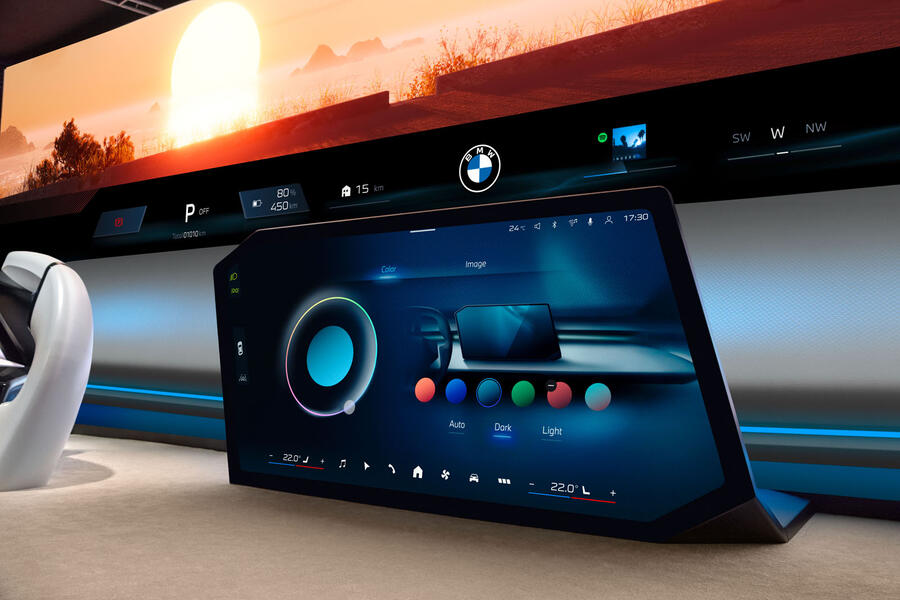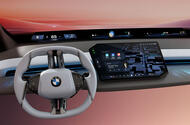New steering wheel uses haptic buttons that illuminate when certain functions become available
New dashboard with angled touchscreen will feature in all future cars; physical buttons will not
BMW has revealed the production version of the next-generation Panoramic iDrive interface that will feature in all of its future models.
The bold new system, revealed at Las Vegas’s CES tech event, will first be used in the production version of the Neue Class X electric SUV, due later this year, then subsequently be adopted by both electric and combustion models.
The Panoramic iDrive interior concept comprises four separate elements, with the most eye-catching a chunky display that is projected across a black strip stretching across the width of the windscreen.
It includes key driving information – such as speed – in front of the driver, alongside which are six customisable ‘particle’ slots.
There is then a centrally positioned touchscreen, which is notably angled towards the driver, running BMW’s new Operating System X software.
Based on Android code, OS X has been developed in-house, with the X (rather than 10) designation subtly noting that it marks a step change from the old OS 9.
For right-hand-drive models, BMW will produce a touchscreen that slopes in the opposite direction.

It is capable of receiving over-the-air software updates and has been fully developed as a touch- and voice-control system.
It has also been designed to be more intuitive. For example, the sat-nav map is now the standard background.
It features no physical controls, with BMW reasoning that these have limited its ability to offer more complex and varied options.
The system works in conjunction with a new steering wheel featuring a number of physical buttons that offer haptic feedback.
Finally there’s an optional 3D head-up display (HUD) that projects info into the driver’s line of sight above the Panoramic Vision strip.
As the various elements have been developed together, BMW claims they are fully integrated. So, for instance, the HUD will show directions while the Panoramic Display gives further info on roads.
BMW said the system was developed based on real-world anonymised usage data gleaned from its existing fleet of more than 22 million vehicles and then refined in usability lab tests.
Key elements of the new BMW interior
3D head-up display This optional unit projects navigation and driving information, complementing that in the Panoramic Display, onto the bottom of the windscreen.
Panoramic Vision
This dashboard spanning projection features six slots. Driving information is fixed, the rest can be customised.
Steering wheel
The primary physical controller features ‘shy-tech’ haptic buttons, which will illuminate when certain functions are available, such as answering a phone call
Central display
Sloped towards the driver for ease of reach, this touchscreen features BMW’s latest operating system, OS X. Voice control also features.
Q&A: Christian Bauer, vice-president of user interface design, BMW

Why is the screen closer to the driver than before?
“In the past, our screens have started behind the steering wheel and extended to the middle, so they have to be a little far away from you. With the Panoramic Vision, we can put the content that is really necessary up there where you have to look anyway and can move the touchscreen closer to you.”
Why is it angled like that?
“We put a 16deg kink on it, which nods to BMW heritage [such as the Hofmeister kink]. But it’s shaped in that direction because it means you have a perfect ergonomic position. It means you have a very short distance from the steering wheel to the display.”
Did you consider a vertically oriented screen?
“We want to enhance driver interaction, and our slogan is ‘eyes on the road and hands on the wheel’, which means everything has to be in a perfect situation. This is the perfect situation for the technology that we have right now.”
Source: Autocar RSS Feed

